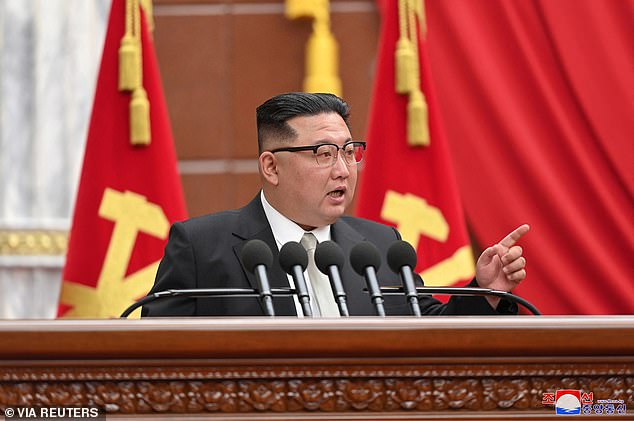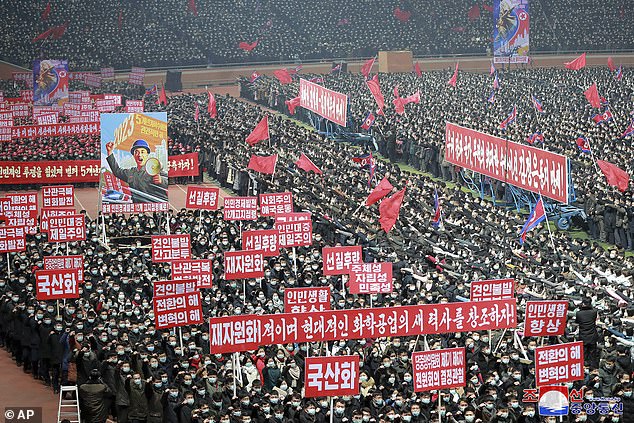North Korean students are expelled and forced to work in a coal mine
>
North Korean students have been expelled from university and forced to work in a coal mine because they sounded as if they had been watching too much foreign TV.
The four students are understood to have been caught speaking on their mobile phones with a softer accent, and using terms of endearment that are associated with people in South Korea, sources inside the authoritarian country said.
Outlawed songs, movies and television shows such as ‘Squid Game’ or ‘Crash Landing on You’ are smuggled into the country on USB flash drives. It is believed the students likely picked up the way of speaking by watching such media.
Speaking like their free neighbours in the South has become trendy among young North Koreans, the sources told Radio Free Asia (RFA). But Pyongyang and Kim Jong-un views such styles of speech as counter-revolutionary and therefore a crime.

North Korean students have been expelled from university and forced to work in a coal mine because they sounded as if they had been watching too much foreign TV, which is banned by dictator Kim Jong-un (pictured in a photo released Jan. 1) in the authoritarian country
‘The phenomenon of using a “puppet accent” is defined by the Central Committee as an unforgivable act of sympathising with the enemy’s plot to infiltrate bourgeois ideology and culture,’ a North Hamgyong province resident told RFA.
Until recently, authorities would order those caught speaking in a way deemed unacceptable to write a self-critical statement, promising they would never use the accent again, the source told the publication.
However, officials are now enacting more serious punishments, he said.
Officials are ordering ‘strong countermeasures, saying that the phenomenon of using the South Korean accent is a counterrevolutionary crime that can disintegrate our internal affairs,’ the source told RFA.
In December 2020, North Korea brought in the Rejection of Reactionary Thought and Culture Act, which punishes citizens with up to two years of hard labour for those who are caught speaking, writing or singing in a South Korean style.
The tough punishment of hard labour could be up to 15 years, while residents who are caught distributing foreign media content face the death penalty.
It was under this law that two teenagers were executed in October for selling USB drives containing South Korean TV shows or films. They were killed by firing squad.
The pair, both boys thought to be aged between 16 and 17, were shot on an airfield in front of terrified locals in the city of Hyesan, on the border with China. The news of their deaths only emerged two months later in December.
A third boy of the same age was executed alongside them for murdering his stepmother, with locals told the crimes were ‘equally evil’ as media distribution.


In December 2020, North Korea brought in the Rejection of Reactionary Thought and Culture Act, which punishes citizens with up to two years of hard labour for those who are caught speaking, writing or singing in a South Korean style. Pictured: This photo provided by the North Korean government shows a rally at May Day stadium, in support of recent meeting of ruling Workers’ Labor Party of Korea, in Pyongyang, North Korea, on January 5, 2023
Foreign media, particularly anything deemed to be ‘Western’, is strictly prohibited in North Korea – which brainwashes its population to unquestionably support the ruling regime. Any dissent is severely punished.
Kim Jong-un views South Korea as an American puppet state, and is sensitive to any of its media crossing the border from China.
But despite strict controls, such items are often smuggled into the country on USB drives or SD cards. These are typically brought over the border from China and then bartered for among North Koreans, particularly among younger citizens.
The ruling Communist regime uses informants recruited from the general population in order to catch those selling the drives, and report them to the authorities.
In the case of the two teenagers, one of these spies reported them for hawking thumb drives containing the programmes in the local marketplace.
Such executions are rare in North Korea but not unheard of, and are typically used to terrify people into obedience when authorities are worried about rule-breaking.
North Korean youth caught watching foreign movies face being sent to a disciplinary labour centre, one source in Hyesan said.
A second offence means being sent to a correctional camp for five years along with their parents, as punishment for failing to discipline their children.
But anyone caught distributing or selling South Korean movies can face the death penalty, even if they are minors, the source added.
In December 2021, it was reported that at least ten civilians in the previous decade had been killed by firing squad for watching South Korean content.
